Global Debates: Robot Doctors' Impact on Patient Experience Analysis
VerifiedAdded on 2023/01/11
|6
|1902
|58
Report
AI Summary
This report critically examines the impact of robot doctors on patient experience within the healthcare system. It explores the benefits of robotic integration, such as improved surgical precision, 24/7 availability, and reduced surgeon fatigue, highlighting advancements like the da Vinci Surgical system and robotic nurses. However, the report also addresses the drawbacks, including potential loss of patient trust due to the absence of human empathy, the risk of over-diagnosis, and ethical concerns surrounding the replacement of human interaction with artificial intelligence. The analysis emphasizes the importance of balancing technological advancements with the need for strong doctor-patient relationships and the potential for negative patient experiences that could undermine the healthcare system. The report concludes by advocating for a careful approach to robot implementation, ensuring that patient trust and well-being remain central to healthcare practices.
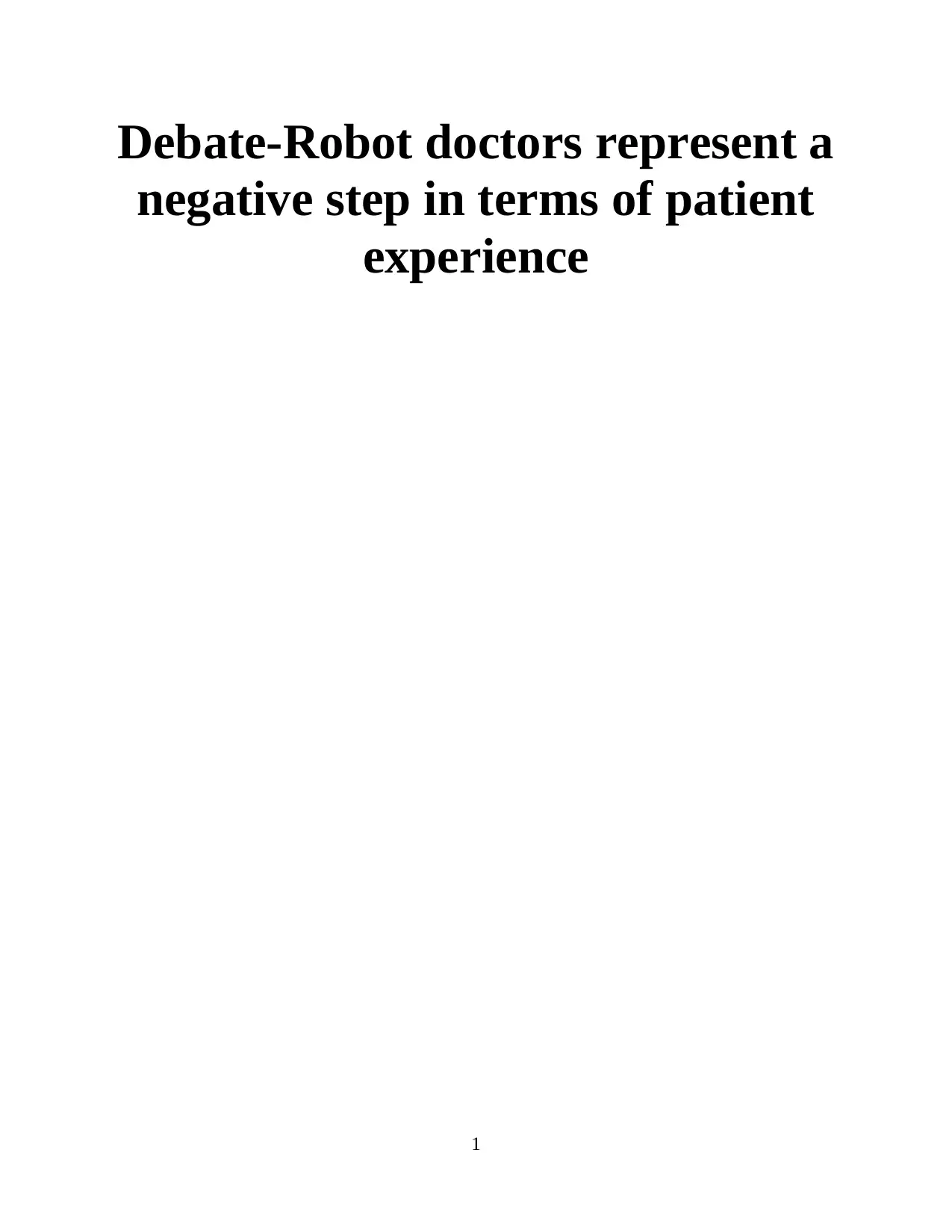
Debate-Robot doctors represent a
negative step in terms of patient
experience
1
negative step in terms of patient
experience
1
Paraphrase This Document
Need a fresh take? Get an instant paraphrase of this document with our AI Paraphraser
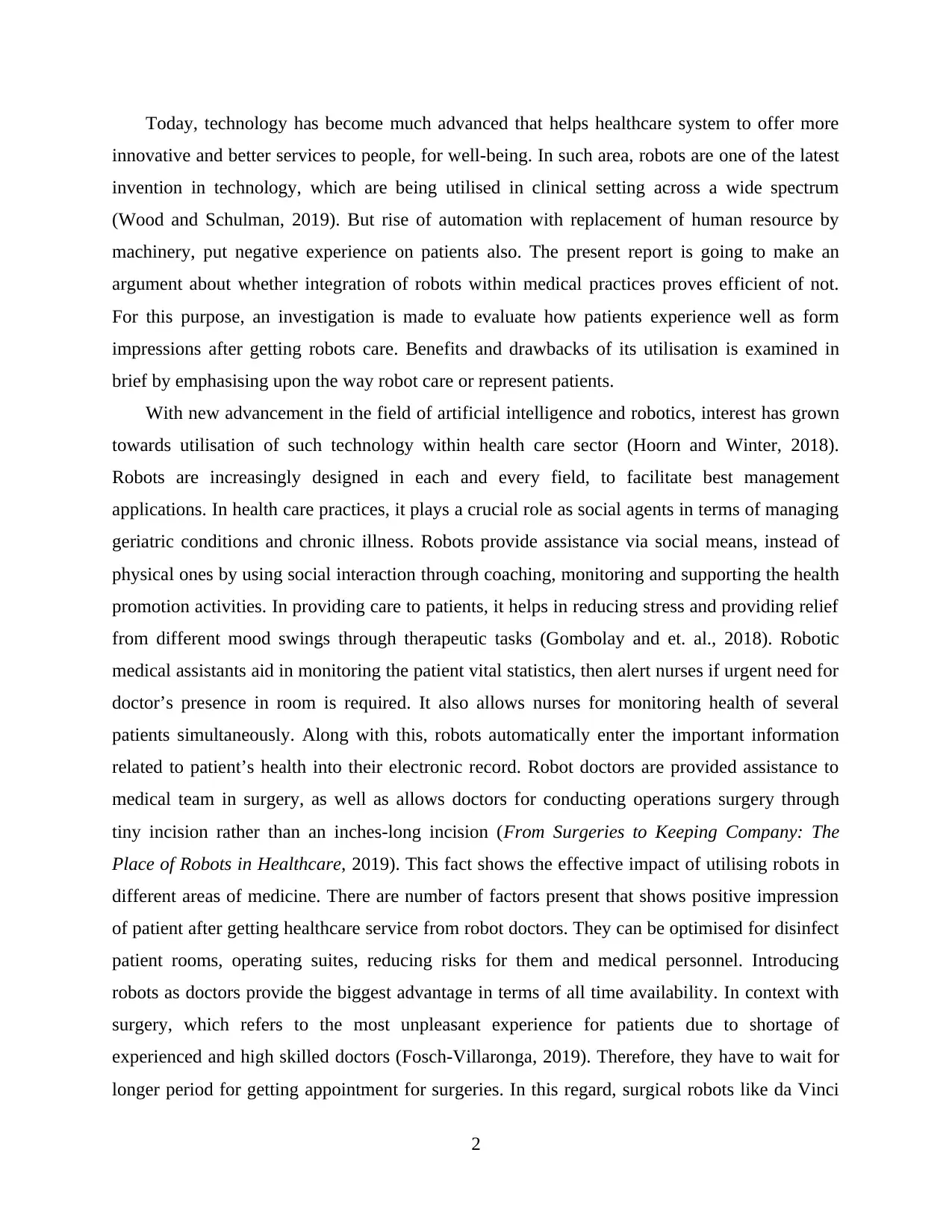
Today, technology has become much advanced that helps healthcare system to offer more
innovative and better services to people, for well-being. In such area, robots are one of the latest
invention in technology, which are being utilised in clinical setting across a wide spectrum
(Wood and Schulman, 2019). But rise of automation with replacement of human resource by
machinery, put negative experience on patients also. The present report is going to make an
argument about whether integration of robots within medical practices proves efficient of not.
For this purpose, an investigation is made to evaluate how patients experience well as form
impressions after getting robots care. Benefits and drawbacks of its utilisation is examined in
brief by emphasising upon the way robot care or represent patients.
With new advancement in the field of artificial intelligence and robotics, interest has grown
towards utilisation of such technology within health care sector (Hoorn and Winter, 2018).
Robots are increasingly designed in each and every field, to facilitate best management
applications. In health care practices, it plays a crucial role as social agents in terms of managing
geriatric conditions and chronic illness. Robots provide assistance via social means, instead of
physical ones by using social interaction through coaching, monitoring and supporting the health
promotion activities. In providing care to patients, it helps in reducing stress and providing relief
from different mood swings through therapeutic tasks (Gombolay and et. al., 2018). Robotic
medical assistants aid in monitoring the patient vital statistics, then alert nurses if urgent need for
doctor’s presence in room is required. It also allows nurses for monitoring health of several
patients simultaneously. Along with this, robots automatically enter the important information
related to patient’s health into their electronic record. Robot doctors are provided assistance to
medical team in surgery, as well as allows doctors for conducting operations surgery through
tiny incision rather than an inches-long incision (From Surgeries to Keeping Company: The
Place of Robots in Healthcare, 2019). This fact shows the effective impact of utilising robots in
different areas of medicine. There are number of factors present that shows positive impression
of patient after getting healthcare service from robot doctors. They can be optimised for disinfect
patient rooms, operating suites, reducing risks for them and medical personnel. Introducing
robots as doctors provide the biggest advantage in terms of all time availability. In context with
surgery, which refers to the most unpleasant experience for patients due to shortage of
experienced and high skilled doctors (Fosch-Villaronga, 2019). Therefore, they have to wait for
longer period for getting appointment for surgeries. In this regard, surgical robots like da Vinci
2
innovative and better services to people, for well-being. In such area, robots are one of the latest
invention in technology, which are being utilised in clinical setting across a wide spectrum
(Wood and Schulman, 2019). But rise of automation with replacement of human resource by
machinery, put negative experience on patients also. The present report is going to make an
argument about whether integration of robots within medical practices proves efficient of not.
For this purpose, an investigation is made to evaluate how patients experience well as form
impressions after getting robots care. Benefits and drawbacks of its utilisation is examined in
brief by emphasising upon the way robot care or represent patients.
With new advancement in the field of artificial intelligence and robotics, interest has grown
towards utilisation of such technology within health care sector (Hoorn and Winter, 2018).
Robots are increasingly designed in each and every field, to facilitate best management
applications. In health care practices, it plays a crucial role as social agents in terms of managing
geriatric conditions and chronic illness. Robots provide assistance via social means, instead of
physical ones by using social interaction through coaching, monitoring and supporting the health
promotion activities. In providing care to patients, it helps in reducing stress and providing relief
from different mood swings through therapeutic tasks (Gombolay and et. al., 2018). Robotic
medical assistants aid in monitoring the patient vital statistics, then alert nurses if urgent need for
doctor’s presence in room is required. It also allows nurses for monitoring health of several
patients simultaneously. Along with this, robots automatically enter the important information
related to patient’s health into their electronic record. Robot doctors are provided assistance to
medical team in surgery, as well as allows doctors for conducting operations surgery through
tiny incision rather than an inches-long incision (From Surgeries to Keeping Company: The
Place of Robots in Healthcare, 2019). This fact shows the effective impact of utilising robots in
different areas of medicine. There are number of factors present that shows positive impression
of patient after getting healthcare service from robot doctors. They can be optimised for disinfect
patient rooms, operating suites, reducing risks for them and medical personnel. Introducing
robots as doctors provide the biggest advantage in terms of all time availability. In context with
surgery, which refers to the most unpleasant experience for patients due to shortage of
experienced and high skilled doctors (Fosch-Villaronga, 2019). Therefore, they have to wait for
longer period for getting appointment for surgeries. In this regard, surgical robots like da Vinci
2
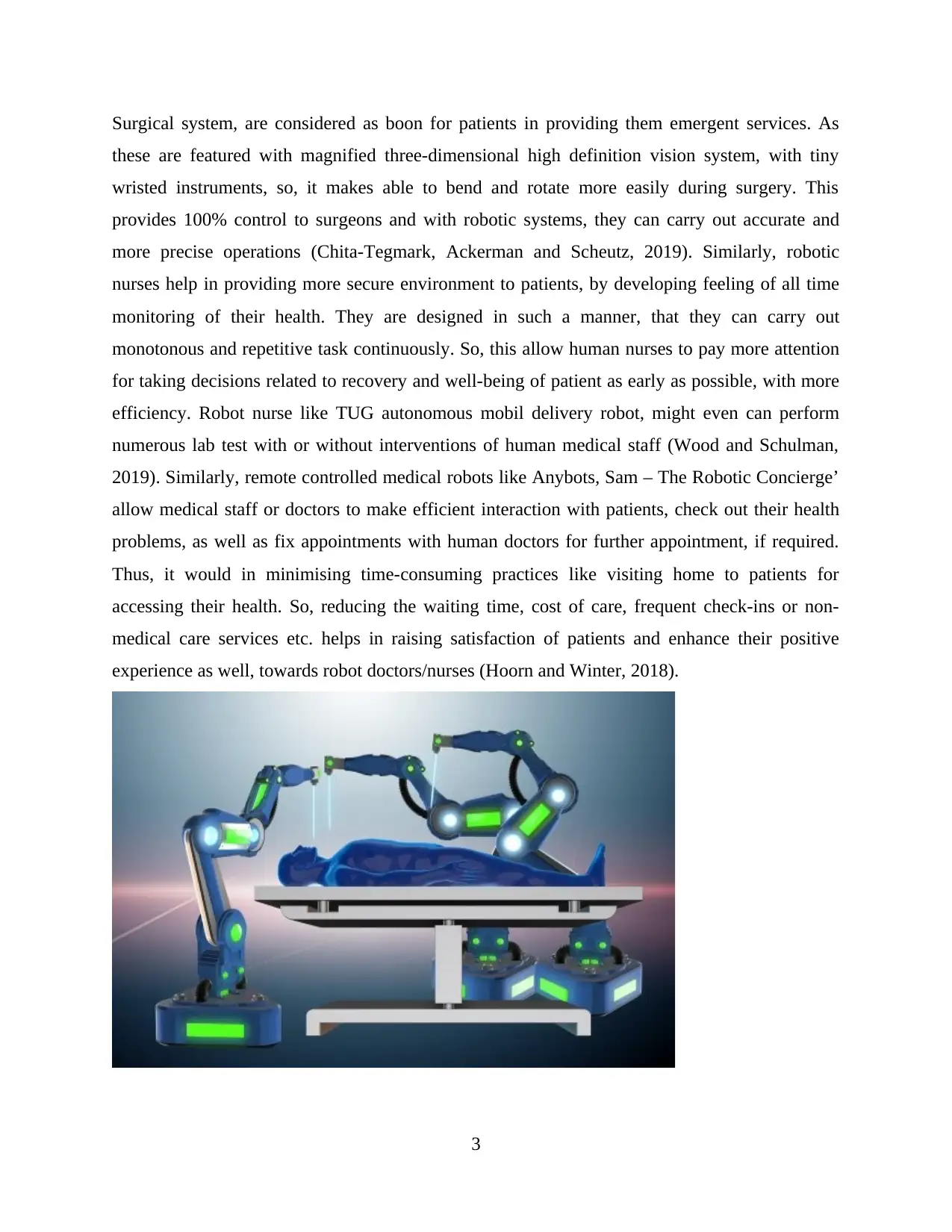
Surgical system, are considered as boon for patients in providing them emergent services. As
these are featured with magnified three-dimensional high definition vision system, with tiny
wristed instruments, so, it makes able to bend and rotate more easily during surgery. This
provides 100% control to surgeons and with robotic systems, they can carry out accurate and
more precise operations (Chita-Tegmark, Ackerman and Scheutz, 2019). Similarly, robotic
nurses help in providing more secure environment to patients, by developing feeling of all time
monitoring of their health. They are designed in such a manner, that they can carry out
monotonous and repetitive task continuously. So, this allow human nurses to pay more attention
for taking decisions related to recovery and well-being of patient as early as possible, with more
efficiency. Robot nurse like TUG autonomous mobil delivery robot, might even can perform
numerous lab test with or without interventions of human medical staff (Wood and Schulman,
2019). Similarly, remote controlled medical robots like Anybots, Sam – The Robotic Concierge’
allow medical staff or doctors to make efficient interaction with patients, check out their health
problems, as well as fix appointments with human doctors for further appointment, if required.
Thus, it would in minimising time-consuming practices like visiting home to patients for
accessing their health. So, reducing the waiting time, cost of care, frequent check-ins or non-
medical care services etc. helps in raising satisfaction of patients and enhance their positive
experience as well, towards robot doctors/nurses (Hoorn and Winter, 2018).
3
these are featured with magnified three-dimensional high definition vision system, with tiny
wristed instruments, so, it makes able to bend and rotate more easily during surgery. This
provides 100% control to surgeons and with robotic systems, they can carry out accurate and
more precise operations (Chita-Tegmark, Ackerman and Scheutz, 2019). Similarly, robotic
nurses help in providing more secure environment to patients, by developing feeling of all time
monitoring of their health. They are designed in such a manner, that they can carry out
monotonous and repetitive task continuously. So, this allow human nurses to pay more attention
for taking decisions related to recovery and well-being of patient as early as possible, with more
efficiency. Robot nurse like TUG autonomous mobil delivery robot, might even can perform
numerous lab test with or without interventions of human medical staff (Wood and Schulman,
2019). Similarly, remote controlled medical robots like Anybots, Sam – The Robotic Concierge’
allow medical staff or doctors to make efficient interaction with patients, check out their health
problems, as well as fix appointments with human doctors for further appointment, if required.
Thus, it would in minimising time-consuming practices like visiting home to patients for
accessing their health. So, reducing the waiting time, cost of care, frequent check-ins or non-
medical care services etc. helps in raising satisfaction of patients and enhance their positive
experience as well, towards robot doctors/nurses (Hoorn and Winter, 2018).
3
⊘ This is a preview!⊘
Do you want full access?
Subscribe today to unlock all pages.

Trusted by 1+ million students worldwide
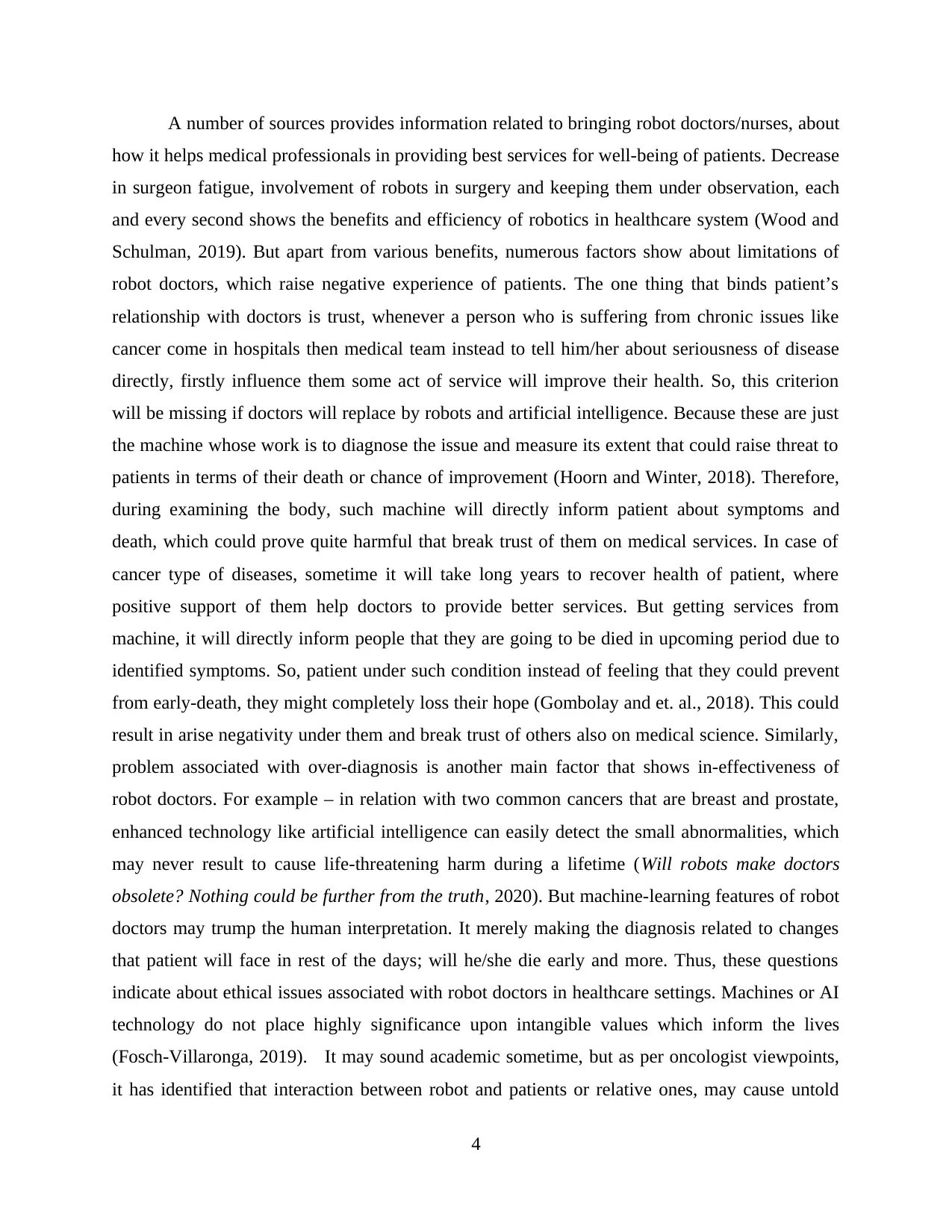
A number of sources provides information related to bringing robot doctors/nurses, about
how it helps medical professionals in providing best services for well-being of patients. Decrease
in surgeon fatigue, involvement of robots in surgery and keeping them under observation, each
and every second shows the benefits and efficiency of robotics in healthcare system (Wood and
Schulman, 2019). But apart from various benefits, numerous factors show about limitations of
robot doctors, which raise negative experience of patients. The one thing that binds patient’s
relationship with doctors is trust, whenever a person who is suffering from chronic issues like
cancer come in hospitals then medical team instead to tell him/her about seriousness of disease
directly, firstly influence them some act of service will improve their health. So, this criterion
will be missing if doctors will replace by robots and artificial intelligence. Because these are just
the machine whose work is to diagnose the issue and measure its extent that could raise threat to
patients in terms of their death or chance of improvement (Hoorn and Winter, 2018). Therefore,
during examining the body, such machine will directly inform patient about symptoms and
death, which could prove quite harmful that break trust of them on medical services. In case of
cancer type of diseases, sometime it will take long years to recover health of patient, where
positive support of them help doctors to provide better services. But getting services from
machine, it will directly inform people that they are going to be died in upcoming period due to
identified symptoms. So, patient under such condition instead of feeling that they could prevent
from early-death, they might completely loss their hope (Gombolay and et. al., 2018). This could
result in arise negativity under them and break trust of others also on medical science. Similarly,
problem associated with over-diagnosis is another main factor that shows in-effectiveness of
robot doctors. For example – in relation with two common cancers that are breast and prostate,
enhanced technology like artificial intelligence can easily detect the small abnormalities, which
may never result to cause life-threatening harm during a lifetime (Will robots make doctors
obsolete? Nothing could be further from the truth, 2020). But machine-learning features of robot
doctors may trump the human interpretation. It merely making the diagnosis related to changes
that patient will face in rest of the days; will he/she die early and more. Thus, these questions
indicate about ethical issues associated with robot doctors in healthcare settings. Machines or AI
technology do not place highly significance upon intangible values which inform the lives
(Fosch-Villaronga, 2019). It may sound academic sometime, but as per oncologist viewpoints,
it has identified that interaction between robot and patients or relative ones, may cause untold
4
how it helps medical professionals in providing best services for well-being of patients. Decrease
in surgeon fatigue, involvement of robots in surgery and keeping them under observation, each
and every second shows the benefits and efficiency of robotics in healthcare system (Wood and
Schulman, 2019). But apart from various benefits, numerous factors show about limitations of
robot doctors, which raise negative experience of patients. The one thing that binds patient’s
relationship with doctors is trust, whenever a person who is suffering from chronic issues like
cancer come in hospitals then medical team instead to tell him/her about seriousness of disease
directly, firstly influence them some act of service will improve their health. So, this criterion
will be missing if doctors will replace by robots and artificial intelligence. Because these are just
the machine whose work is to diagnose the issue and measure its extent that could raise threat to
patients in terms of their death or chance of improvement (Hoorn and Winter, 2018). Therefore,
during examining the body, such machine will directly inform patient about symptoms and
death, which could prove quite harmful that break trust of them on medical services. In case of
cancer type of diseases, sometime it will take long years to recover health of patient, where
positive support of them help doctors to provide better services. But getting services from
machine, it will directly inform people that they are going to be died in upcoming period due to
identified symptoms. So, patient under such condition instead of feeling that they could prevent
from early-death, they might completely loss their hope (Gombolay and et. al., 2018). This could
result in arise negativity under them and break trust of others also on medical science. Similarly,
problem associated with over-diagnosis is another main factor that shows in-effectiveness of
robot doctors. For example – in relation with two common cancers that are breast and prostate,
enhanced technology like artificial intelligence can easily detect the small abnormalities, which
may never result to cause life-threatening harm during a lifetime (Will robots make doctors
obsolete? Nothing could be further from the truth, 2020). But machine-learning features of robot
doctors may trump the human interpretation. It merely making the diagnosis related to changes
that patient will face in rest of the days; will he/she die early and more. Thus, these questions
indicate about ethical issues associated with robot doctors in healthcare settings. Machines or AI
technology do not place highly significance upon intangible values which inform the lives
(Fosch-Villaronga, 2019). It may sound academic sometime, but as per oncologist viewpoints,
it has identified that interaction between robot and patients or relative ones, may cause untold
4
Paraphrase This Document
Need a fresh take? Get an instant paraphrase of this document with our AI Paraphraser
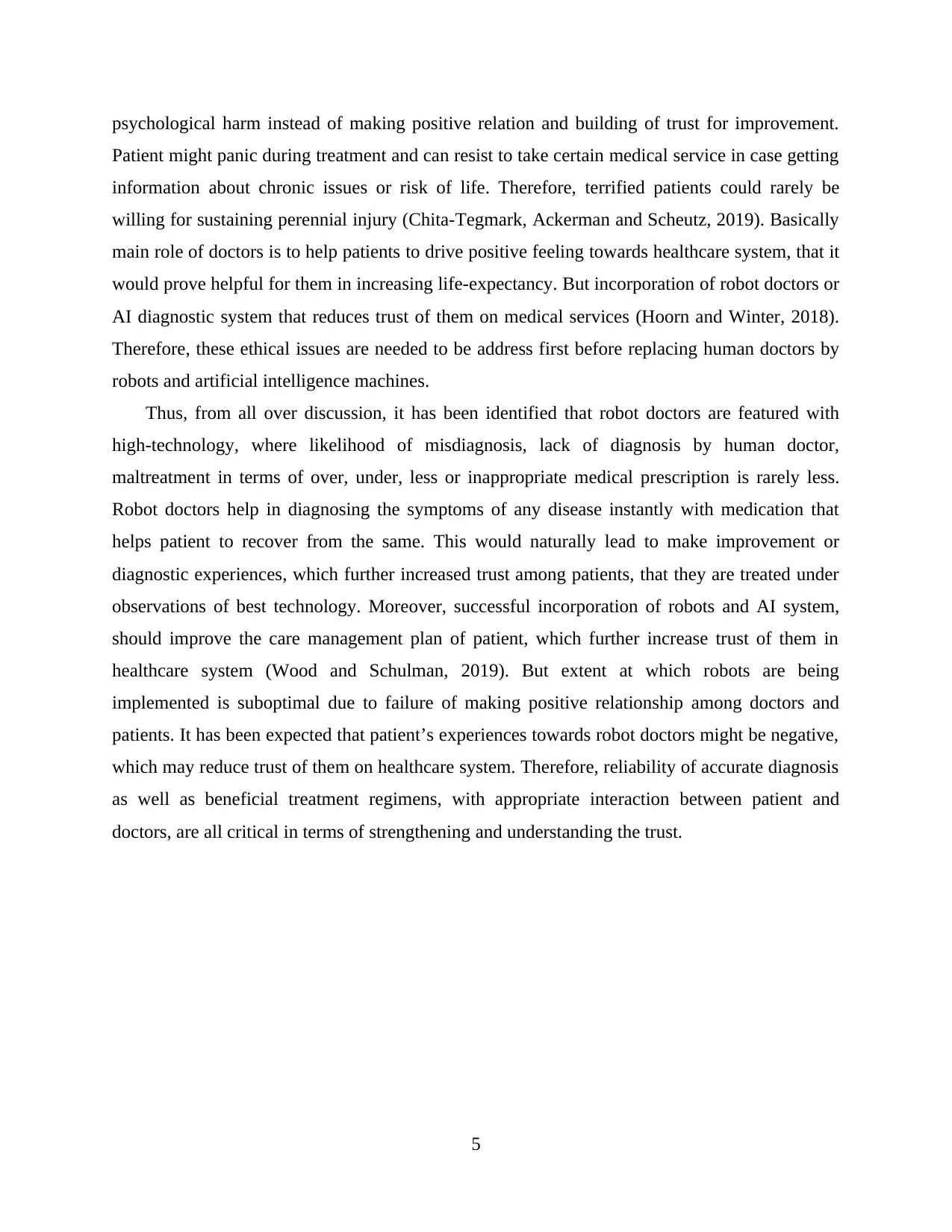
psychological harm instead of making positive relation and building of trust for improvement.
Patient might panic during treatment and can resist to take certain medical service in case getting
information about chronic issues or risk of life. Therefore, terrified patients could rarely be
willing for sustaining perennial injury (Chita-Tegmark, Ackerman and Scheutz, 2019). Basically
main role of doctors is to help patients to drive positive feeling towards healthcare system, that it
would prove helpful for them in increasing life-expectancy. But incorporation of robot doctors or
AI diagnostic system that reduces trust of them on medical services (Hoorn and Winter, 2018).
Therefore, these ethical issues are needed to be address first before replacing human doctors by
robots and artificial intelligence machines.
Thus, from all over discussion, it has been identified that robot doctors are featured with
high-technology, where likelihood of misdiagnosis, lack of diagnosis by human doctor,
maltreatment in terms of over, under, less or inappropriate medical prescription is rarely less.
Robot doctors help in diagnosing the symptoms of any disease instantly with medication that
helps patient to recover from the same. This would naturally lead to make improvement or
diagnostic experiences, which further increased trust among patients, that they are treated under
observations of best technology. Moreover, successful incorporation of robots and AI system,
should improve the care management plan of patient, which further increase trust of them in
healthcare system (Wood and Schulman, 2019). But extent at which robots are being
implemented is suboptimal due to failure of making positive relationship among doctors and
patients. It has been expected that patient’s experiences towards robot doctors might be negative,
which may reduce trust of them on healthcare system. Therefore, reliability of accurate diagnosis
as well as beneficial treatment regimens, with appropriate interaction between patient and
doctors, are all critical in terms of strengthening and understanding the trust.
5
Patient might panic during treatment and can resist to take certain medical service in case getting
information about chronic issues or risk of life. Therefore, terrified patients could rarely be
willing for sustaining perennial injury (Chita-Tegmark, Ackerman and Scheutz, 2019). Basically
main role of doctors is to help patients to drive positive feeling towards healthcare system, that it
would prove helpful for them in increasing life-expectancy. But incorporation of robot doctors or
AI diagnostic system that reduces trust of them on medical services (Hoorn and Winter, 2018).
Therefore, these ethical issues are needed to be address first before replacing human doctors by
robots and artificial intelligence machines.
Thus, from all over discussion, it has been identified that robot doctors are featured with
high-technology, where likelihood of misdiagnosis, lack of diagnosis by human doctor,
maltreatment in terms of over, under, less or inappropriate medical prescription is rarely less.
Robot doctors help in diagnosing the symptoms of any disease instantly with medication that
helps patient to recover from the same. This would naturally lead to make improvement or
diagnostic experiences, which further increased trust among patients, that they are treated under
observations of best technology. Moreover, successful incorporation of robots and AI system,
should improve the care management plan of patient, which further increase trust of them in
healthcare system (Wood and Schulman, 2019). But extent at which robots are being
implemented is suboptimal due to failure of making positive relationship among doctors and
patients. It has been expected that patient’s experiences towards robot doctors might be negative,
which may reduce trust of them on healthcare system. Therefore, reliability of accurate diagnosis
as well as beneficial treatment regimens, with appropriate interaction between patient and
doctors, are all critical in terms of strengthening and understanding the trust.
5
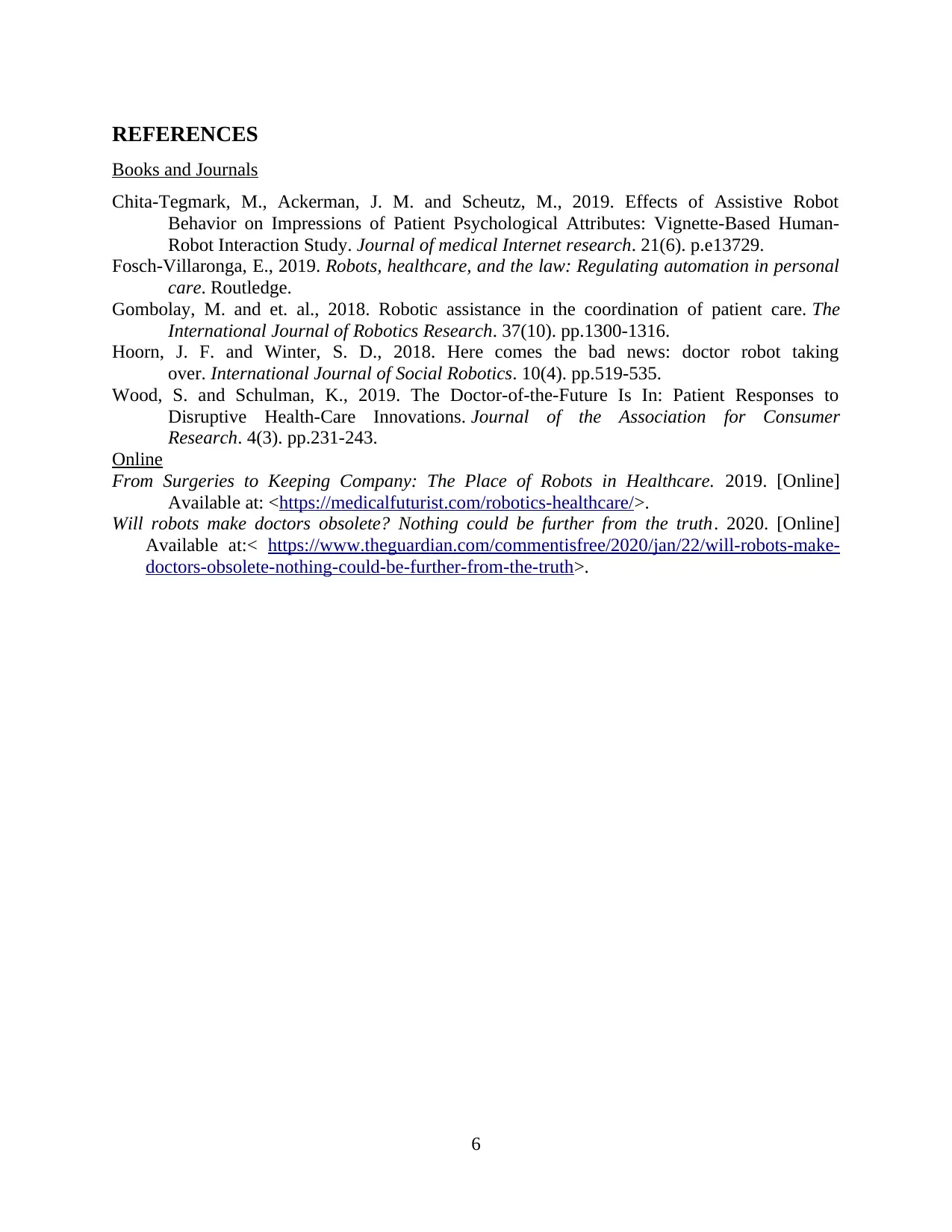
REFERENCES
Books and Journals
Chita-Tegmark, M., Ackerman, J. M. and Scheutz, M., 2019. Effects of Assistive Robot
Behavior on Impressions of Patient Psychological Attributes: Vignette-Based Human-
Robot Interaction Study. Journal of medical Internet research. 21(6). p.e13729.
Fosch-Villaronga, E., 2019. Robots, healthcare, and the law: Regulating automation in personal
care. Routledge.
Gombolay, M. and et. al., 2018. Robotic assistance in the coordination of patient care. The
International Journal of Robotics Research. 37(10). pp.1300-1316.
Hoorn, J. F. and Winter, S. D., 2018. Here comes the bad news: doctor robot taking
over. International Journal of Social Robotics. 10(4). pp.519-535.
Wood, S. and Schulman, K., 2019. The Doctor-of-the-Future Is In: Patient Responses to
Disruptive Health-Care Innovations. Journal of the Association for Consumer
Research. 4(3). pp.231-243.
Online
From Surgeries to Keeping Company: The Place of Robots in Healthcare. 2019. [Online]
Available at: <https://medicalfuturist.com/robotics-healthcare/>.
Will robots make doctors obsolete? Nothing could be further from the truth. 2020. [Online]
Available at:< https://www.theguardian.com/commentisfree/2020/jan/22/will-robots-make-
doctors-obsolete-nothing-could-be-further-from-the-truth>.
6
Books and Journals
Chita-Tegmark, M., Ackerman, J. M. and Scheutz, M., 2019. Effects of Assistive Robot
Behavior on Impressions of Patient Psychological Attributes: Vignette-Based Human-
Robot Interaction Study. Journal of medical Internet research. 21(6). p.e13729.
Fosch-Villaronga, E., 2019. Robots, healthcare, and the law: Regulating automation in personal
care. Routledge.
Gombolay, M. and et. al., 2018. Robotic assistance in the coordination of patient care. The
International Journal of Robotics Research. 37(10). pp.1300-1316.
Hoorn, J. F. and Winter, S. D., 2018. Here comes the bad news: doctor robot taking
over. International Journal of Social Robotics. 10(4). pp.519-535.
Wood, S. and Schulman, K., 2019. The Doctor-of-the-Future Is In: Patient Responses to
Disruptive Health-Care Innovations. Journal of the Association for Consumer
Research. 4(3). pp.231-243.
Online
From Surgeries to Keeping Company: The Place of Robots in Healthcare. 2019. [Online]
Available at: <https://medicalfuturist.com/robotics-healthcare/>.
Will robots make doctors obsolete? Nothing could be further from the truth. 2020. [Online]
Available at:< https://www.theguardian.com/commentisfree/2020/jan/22/will-robots-make-
doctors-obsolete-nothing-could-be-further-from-the-truth>.
6
⊘ This is a preview!⊘
Do you want full access?
Subscribe today to unlock all pages.

Trusted by 1+ million students worldwide
1 out of 6
Related Documents
Your All-in-One AI-Powered Toolkit for Academic Success.
+13062052269
info@desklib.com
Available 24*7 on WhatsApp / Email
![[object Object]](/_next/static/media/star-bottom.7253800d.svg)
Unlock your academic potential
Copyright © 2020–2026 A2Z Services. All Rights Reserved. Developed and managed by ZUCOL.





